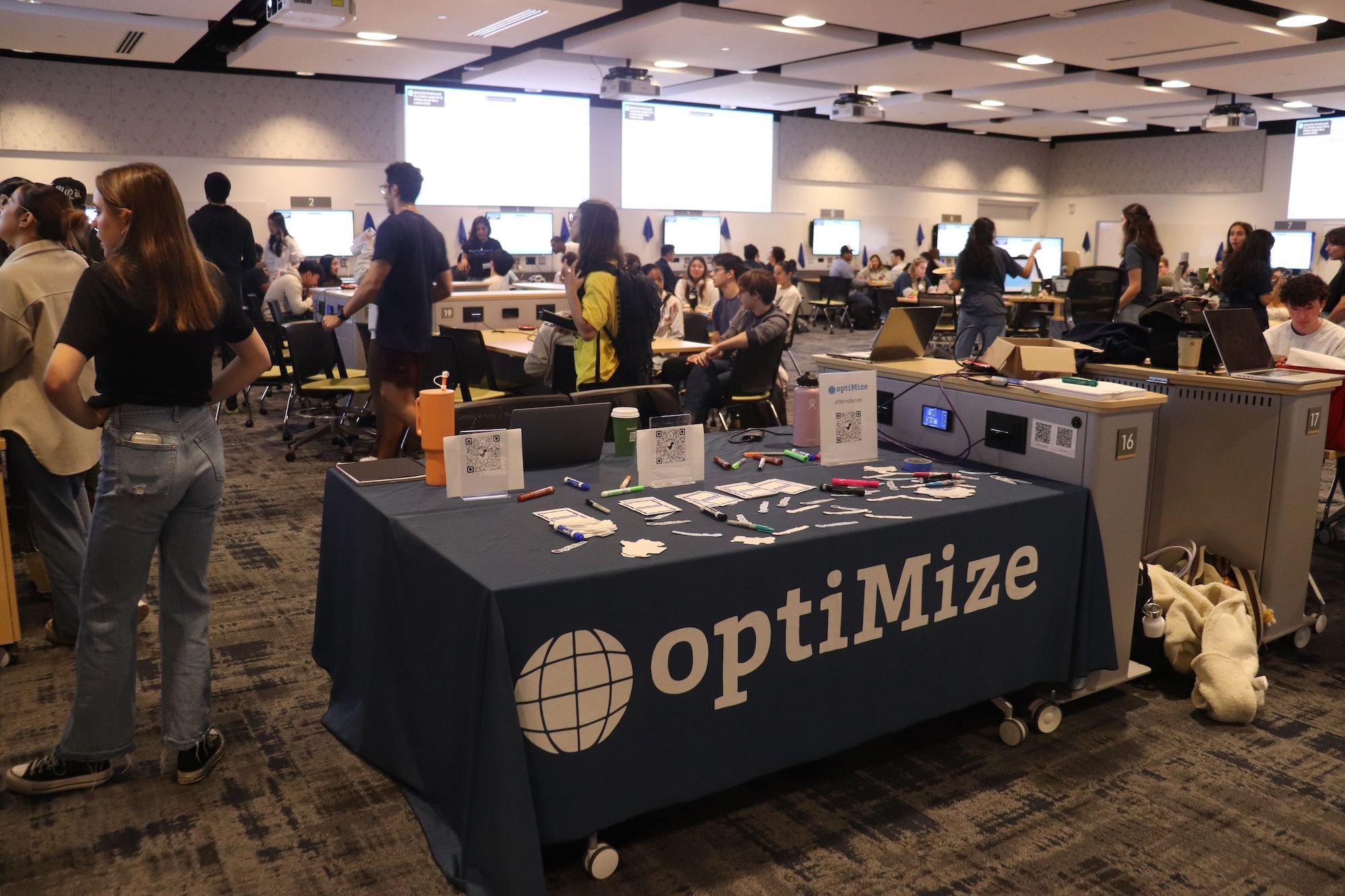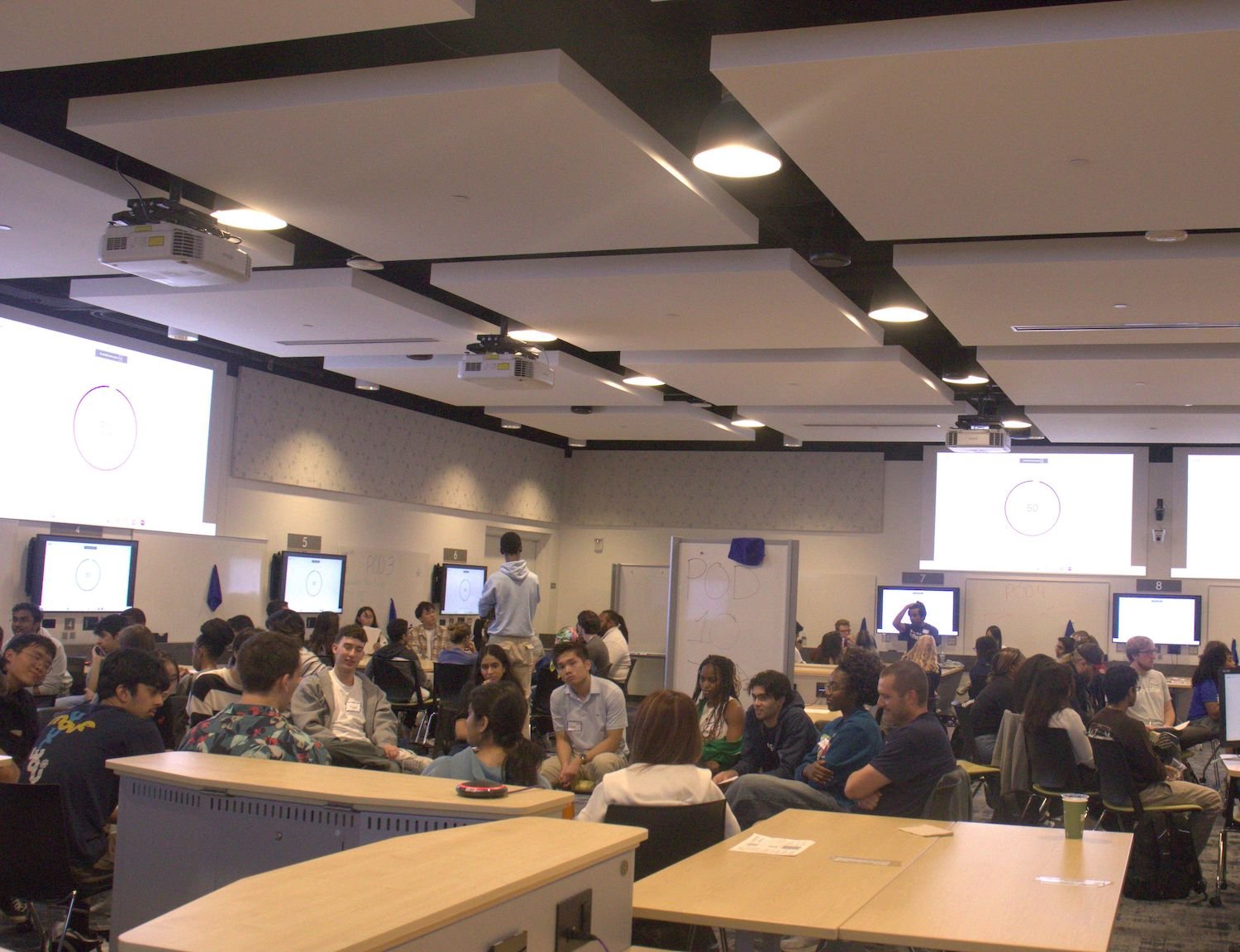Reimagined SIC: Part I - PARTICIPANT EXPERIENCE
Learning from feedback, our team took time this summer to reimagine the Social Innovation Challenge — from the curriculum and mentorship model to the involvement of Transfer Bridge Fellows in the SIC! We’ll be presenting these changes through a 3-part blog series, starting with the participant experience and how we updated it from feedback and collaborative change.
optiMize welcome table at all workshops
One of the primary teachings of the Social Innovation Challenge (SIC) is the importance of the feedback loop. We took this to heart at the end of last year’s SIC when listening to the feedback from our participants and staff. We heard about how great it is to have a community of people working together to effect change, but we also heard about wanting to have more opportunities to connect and learn from one another. That prompted us to reevaluate the SIC from the lens of the participant (our stakeholder) - something we tell our participants to do with their projects! We also used this opportunity to question, “does this still fit?” when thinking about our program in a post-COVID world.
After our Challenge ended, our new Challenge Leads and Peer Mentors got to work reviewing feedback and ideating on a new experience for the Social Innovation Challenge. They used some of our key decision-making tactics to propose their ideas for change through a collaborative change document, which is when all staff review the proposal and record any questions and concerns. This process went back and forth a few times among staff until all questions and concerns were addressed. In the end, we had a new path forward for a revised Social Innovation Challenge that restructured the participant experience to add more value and foster greater collaboration between participants, mentors, student staff, and the greater community.
Participant Experience: New Workshop Series and Structure
One of the primary points of feedback was the length of our workshops. In this post-COVID campus, students don’t have 4 hours to spend with us on a Sunday, and we wanted to respect that. Therefore, we expanded from our traditional 5 workshops to 6 comprehensive workshops, each designed to deepen learning and enhance skills. To make this experience even more robust, we also introduced a new orientation event prior to the workshop series focused on commitment, setting intentions, and team building.
In addition to the 6-part workshop series, we are once again hosting Needs and Leads and have added specialized sessions to guide participants in building their prototypes and pitches, offering individualized support. We first piloted “Build your Pitch” two years ago as a more casual way for participants to work with our Support Team and peer mentors to gain feedback and assistance and it was a great turnout. Therefore, these specialized “Build Your Prototype” and “Build Your Pitch” sessions are now embedded throughout the SIC. Practice and selection pitch opportunities continue to be a part of this journey, alongside funding applications and a final showcase.
Added Tracks
To better embed our work across the broader university community, we've introduced five new tracks to complement our general track: Climate Solutions, Urban Entrepreneurship, Undergraduate Education, Healthcare, and LSA’s Honors in Engaged Liberal Arts. Projects aligned with these tracks will receive tailored resources and mentorship. Several tracks come from our partnerships with departments across the university, including the College of LSA and U-M Office of the Provost for Undergraduate Education.
We're also in our second year of collaboration with the Bridge Scholars Plus (BSP), where we host a specific SIC for BSP scholars. We’re extremely grateful to our university partners for empowering more students to join the SIC and enriching their experience.
Workshop Structure
Each workshop starts with lunch catered locally, providing a space for participants to eat and network. Following lunch, participants hear from our challenge leads who facilitate a curriculum that is mapped to specific learning opportunities along the project design process. During the presentation, participants are encouraged to follow along through the Social Innovation Challenge Participant Guidebook. This new guidebook contains activities as follow-ups to the curriculum presented, keeping participants on track as they develop their idea.
After the first half of the workshop, participants and student staff are dispersed across the room for PODs, which is described in the next section.
PODs: Peer-Oriented Discussions
PODs are led by student facilitators and create a space for participants to get to know each other, discuss topics in a smaller setting, and receive mentor advice.
PODs (Peer-Oriented Discussions) are small discussion groups led by peers and supported by mentors and Support Team members. Following the workshop presentation, participants break into small groups to discuss learnings from the workshop and share reflections relevant to their project. optiMize student staff facilitate the PODs, with each group having two facilitators — typically a combination of a challenge lead or peer mentor alongside a veteran staff member. The goal is to foster a deeper connection and dialogue among participants, as they now have a smaller space to share their wins and challenges with peers of similar projects. Mentors also join these discussions to enrich the conversation, while facilitators guide discussions and capture key elements to support ongoing evaluation efforts.
PODs also strengthen our organization’s leadership development program, eMerge. The week before each workshop, full-time staff members conduct facilitator training during leadership meetings with student leaders to review the workshop curriculum, prepare for PODs, and offer facilitation strategies. Student staff bring in feedback after each POD, allowing student and full-time staff to iterate on the POD experience.
Additionally, our Support Team program has been improved to better help individuals grow in facilitation and leadership skills. PODs provide Support Team members the ability to practice their skills in a smaller group setting, creating connections between participants and building a fun space for the community.
POD groupings are customized to the workshop content—sometimes organized by topic, and other times based on project status—ensuring participants can connect with peers who can better empathize with project needs and may have more relevant leads.
Supporting Tools & Technologies
Our TechOps team continues to excel in bringing improvements to the optiPortal, our information database for everything related to the SIC. This interface is built on Airtable and is the go-to hub for participants, with everything from workshop event dates to directories of other participants, projects, and mentors. These directories will help participants connect with teams and mentors of interest outside of in-person workshops.
We’ve also introduced a “Needs and Leads” Trello board for SIC participants to add any needs (looking for advice/resources) and respond to others with leads. This brings our highly appreciated in-person Needs & Leads event to an ongoing digital format.
Following the success of previous years, we continue to update our Participant Resources page with slides, recordings, and additional resources for participants to review. Our Slack channel also connects participants in one channel, allowing for more communication between participants and optiMize staff. Channel members are encouraged to post questions, opportunities, appreciations, and more.
Looking Forward
After celebrating our 10-year anniversary in 2022, we became a model for how universities can partner with students to create high-impact experiential learning for the 21st century. This year, our intention is to focus on DEI, evaluation and improvement efforts. As we introduce these new changes to the Social Innovation Challenge, we’re also following the SIC design thinking process ourselves — evaluating performance based on stakeholder feedback and continuously iterating to improve the student experience. As we do so, please email us at any time with feedback!
Stay tuned for the next part of this “Reimagined SIC” series, where we’ll talk about how we’ve been improving the SIC’s mentorship program!



